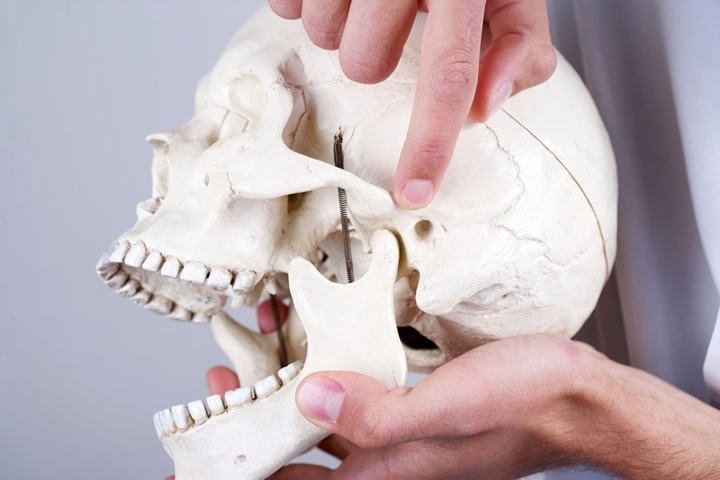
Opening and closing the mouth is a blessing, and we do not acknowledge it!
Problems related to your temporomandibular joint (TMJ | TMD) can make you extremely restless and uncomfortable because this joint, which is located near the ears, helps in the opening, closing, and moving of the mouth (jaw). Any TMJ | TMD problems should be treated instantly, removing the cause for good.
TMJ related problems can occur due to several reasons, which need to be addressed, such as;
- The habit of grinding teeth consciously or unconsciously (bruxism).
- Stress.
- Excessive gum chewing.
- Aging (decreasing the fluid in the joint).
- Joint related medical problems such as arthritis.
- Trauma to the jaw during childhood or adolescence.
In any case, it can cause severe pain to the patient leading to limited mouth opening and difficulty in eating. Jaw joint problems can be one of the reasons behind headaches and neck-aches as well.
BRUXISM:
The most commonly prevailing habit which causes TMJ | TMD problems is bruxism. In bruxism, people have the subconscious habit of clenching teeth when in stress or anger and teeth grinding while sleeping. Bruxism needs to be treated and managed accordingly to save the patient from any pain.
The cause of bruxism has to be managed, or the treatment will not be sufficient. Things that can cause bruxism are;
- Stress
- Anxiety
- Anger
- Medicines
- Sleep disorders
How do you treat sleep bruxism (night grinding)?
Sleeping leaves you unaware of your surroundings; hence people who grind their teeth while sleeping are not aware of it unless they experience pain in their TMJ area, headache, pain in their jaw, and while opening their mouth with other dental problems such as teeth sensitivity. Sleep bruxism is diagnosed when they visit a dentist or somebody tells them that they were making clenching/teeth grinding noises while sleeping. Sleep bruxism should be treated and seeing a dentist must be a priority!
When considering the treatment options for sleep bruxism, it is essential to remove the cause of it for example;
- Reduce anxiety and stress by treating them with relevant medicines.
- Wearing a soft mouth guard (occlusal splints).
- Use of mandibular devices.
- Stop chewing gum.
- TMJ exercises.
- Improved sleep habits; relax before sleeping, never have any triggering substance (usually caffeine) after evening.
- Muscle relaxants prescribe by your doctor before bedtime (it is a temporary treatment).
- People who suffer from extreme bruxism may need botox injections to reduce the hyperactivity of the masseter (one of the chewing muscles).
- Routine dental exams.
- Counseling.
It is better to say that bruxism is managed rather than cured because it is an unconscious habit and the patients have no control over it. TMJ appliances are an effective method of breaking the habit at a subconscious level so that TMJ problems and their harmful effects are kept at bay.
What vitamin deficiency causes teeth grinding?
Excess and deficiency of anything are equally at fault; lack of vitamins has been linked to several diseases; one of them is teeth grinding. Vitamins such as vitamin C, vitamin B-5, calcium, and magnesium have been reported to cause teeth grinding (bruxism).
But how do they cause teeth grinding?
In the body, calcium is not absorbed without vitamin D; hence balanced levels of both are essential. Calcium helps the muscles to relax correctly; with the deficient amount of calcium, people have difficulty in relaxing their muscles, and when this occurs in TMJ muscles, it leads to teeth grinding,
Deficiency of vitamin B-5, vitamin C, and magnesium have been said to cause sleep deprivation, which can cause teeth grinding. Hence maintain a balanced diet, and keeping the vitamins and other body minerals in check is essential.
Which night guard is the best for teeth grinding?
Mouthguards or night guards are intraoral appliances specially designed to fit-in and align your jaw and teeth to reduce the tension in joints and muscles, leading to decreased or no sleep due to bruxism/teeth grinding. Mouthguards can be made for anyone such as athletes, sportsmen, or people with bruxism, while night guards are only for people who have the habit of grinding their teeth at night and are usually made for upper teeth since they are more comfortable.
The best kind of a night guard for the patient is a custom-made mouth protector called a nocturnal bite plate (or bite splint); they are vastly preferred for patients who grind their teeth at night and helps to reduce the clenching of the jaw. It fits in perfectly.
Nightguards should be cleaned appropriately by soft toothbrushes, antibacterial soaps, or rinsing with running water for 30 seconds before and after use. Your dentist Dr.Shoaib Durrani at Durrani’s Dental Clinic will properly guide you and ensure that the patients know everything about the dental appliance (such as a night guard in this case) to take care of it. Call us at +92-21-37227441 to book an appointment and get the best possible dental care at your service!

